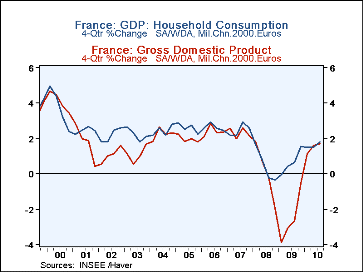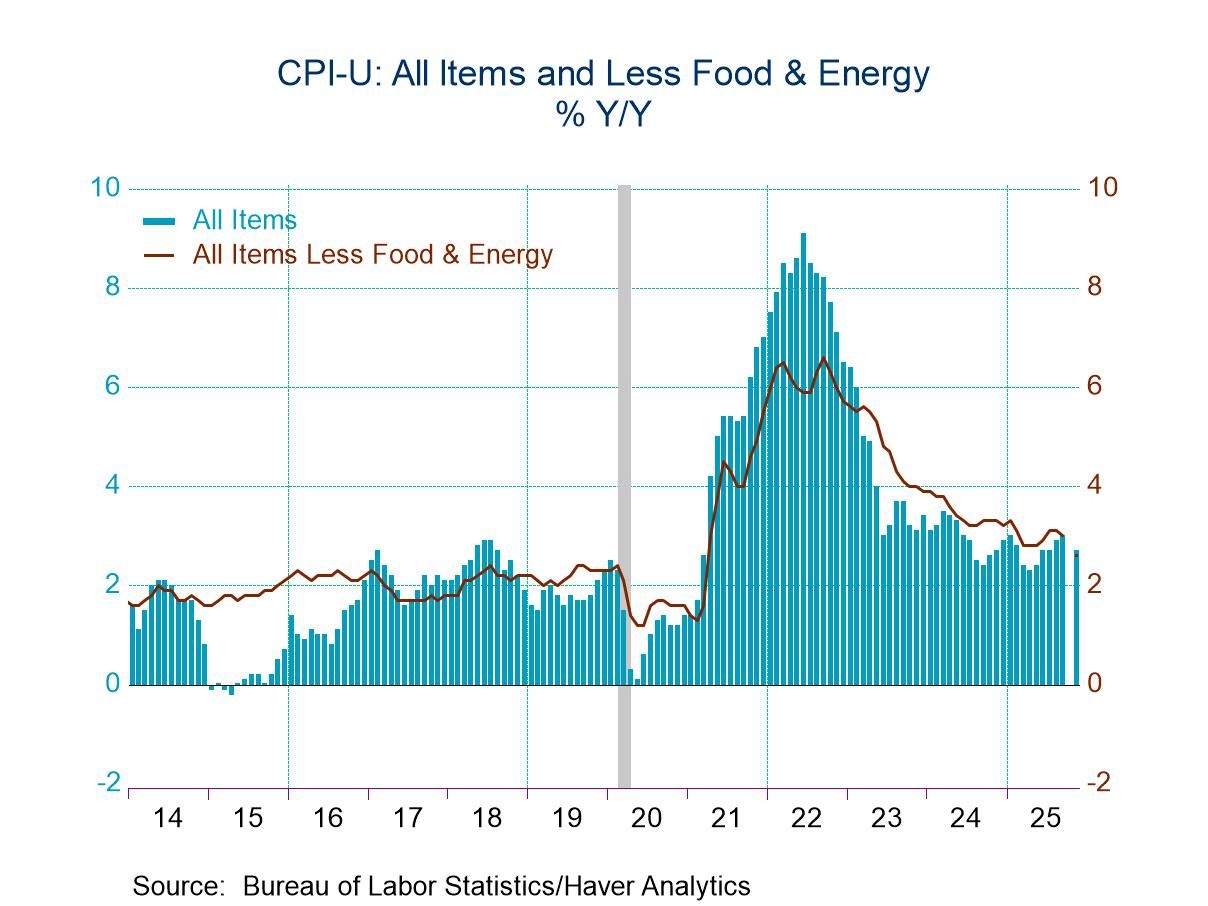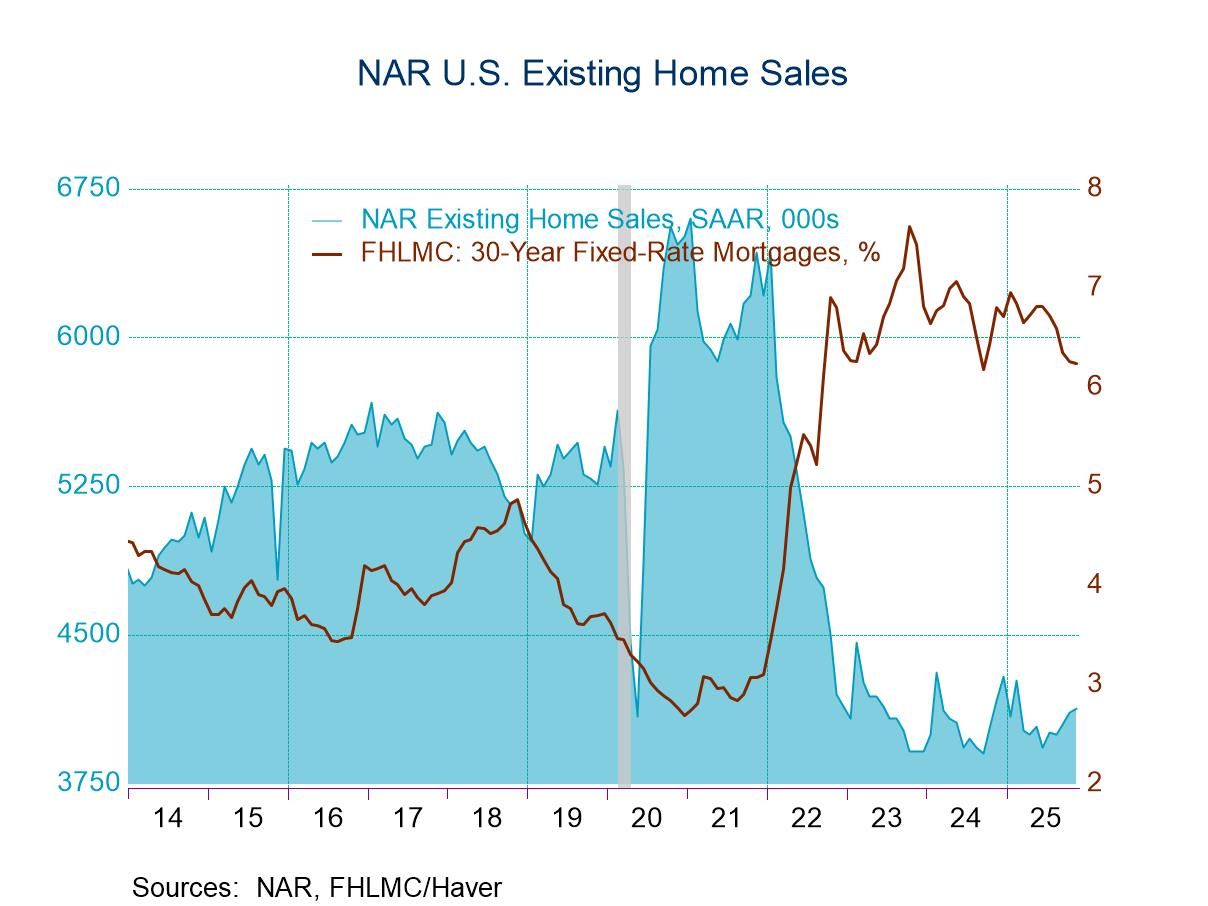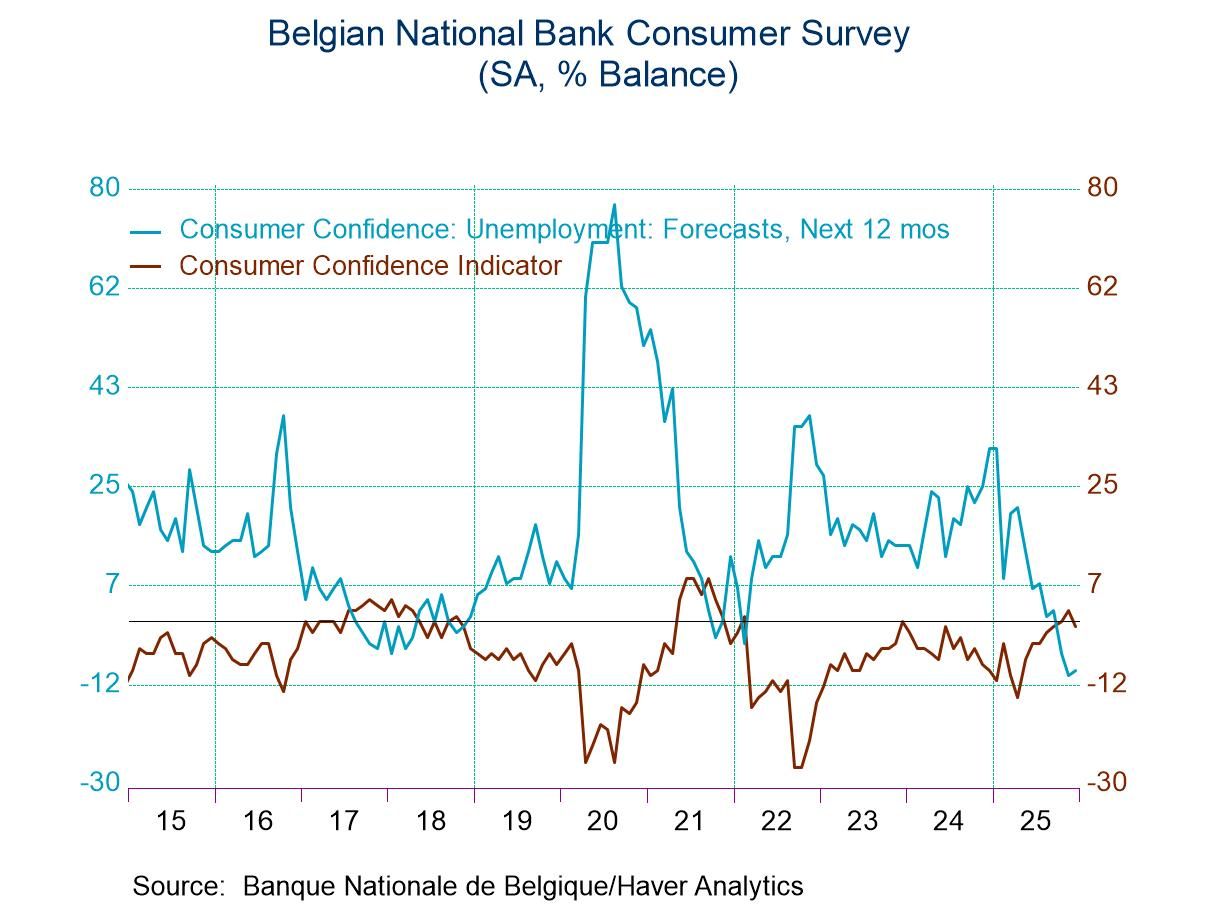 Global| Dec 28 2010
Global| Dec 28 2010French GDP Growth Is Trimmed Back
Summary
Despite some slight downward GDP revisions, the chart shows that France's economic recovery is still in train, with both GDP and household consumption rising at an accelerating pace. The sense of acceleration is slowing, however. [...]
 Despite some slight downward GDP revisions, the chart shows that France's economic recovery is still in train,
with both GDP and household consumption rising at an accelerating pace. The sense of acceleration is slowing, however.
Yr/Yr GDP is up at a 1.7% pace compared to a 1.6% pace in Q2. Private consumption is still accelerating a bit better than that,
rising at 1.8% pace after two quarters at 1.5% Yr/Yr.
Despite some slight downward GDP revisions, the chart shows that France's economic recovery is still in train,
with both GDP and household consumption rising at an accelerating pace. The sense of acceleration is slowing, however.
Yr/Yr GDP is up at a 1.7% pace compared to a 1.6% pace in Q2. Private consumption is still accelerating a bit better than that,
rising at 1.8% pace after two quarters at 1.5% Yr/Yr.
The growth rates for GDP and for private consumption essentially have converged in France so that private consumption is not carrying the load of accelerating growth anymore. With that fact in the background though, it is still true that consumption speed and the pace of GDP growth both have picked up the pace. Yet import growth has accelerated, taking away some of the punch from improved consumption on GDP. Exports have improved too, blunting some of the impact of rising imports which otherwise would have degraded GDP growth by even more.
Still exports seem a false hope here. In 2010-Q1 export growth yr/yr surpassed import growth by seven percentage points; in Q3 that was down to 1.8 percentage points; in Q3 that difference is 2.4 percentage points but has turned in favor of imports. Trade trends are no longer a positive for France's GDP. But as we saw consumption is still eking out better gains to bolster GDP but with its negative side effects on trade.
Construction spending in France is still contracting on an uneven trend. Investment spending is on an improving trend but was set back in the quarter. Public consumption spending has diminished its yr/yr growth rate but has accelerated in two of the last three quarters. Meanwhile France is implementing an austerity program making the push to growth from the public sector less likely to endure.
With these revisions in GDP growth France is growing just a little slower - nothing dramatic or game-changing. Still, the GDP components do not give us a real sense of what will drive GDP ahead. Although consumption spending is steady-to-improving the shift to austerity could change that. Trade is no longer a clear engine of growth. Without an improved economic climate construction will not get better and investment is already a question mark, at least as to speed. France epitomizes the challenges in Europe under the German-led notion that austerity is the road to prosperity and not to serfdom. In 2011 this notion will get a stronger test.
| French GDP | |||||||
|---|---|---|---|---|---|---|---|
| Consumption | Capital Formation | ||||||
| GDP | Private | Public | G Fix Invst | Construct | Exports | Imports | |
| % Change Q/Q | |||||||
| Q3-10 | 1.2% | 2.0% | 1.4% | -1.7% | -2.4% | 12.5% | 18.3% |
| Q2-10 | 2.4% | 1.1% | 1.1% | 10.5% | -1.3% | 12.1% | 18.0% |
| Q1-10 | 0.8% | 0.2% | -0.2% | 0.3% | -9.2% | 22.3% | 8.1% |
| Q4-09 | 2.5% | 3.9% | 2.5% | 21.3% | -7.6% | 4.1% | 16.0% |
| % Change Yr/Yr | |||||||
| Q3-10 | 1.7% | 1.8% | 1.2% | 7.2% | -5.2% | 12.6% | 15.0% |
| Q2-10 | 1.6% | 1.5% | 1.6% | 11.6% | -6.8% | 11.8% | 10.0% |
| Q1-10 | 1.2% | 1.5% | 2.1% | 9.6% | -7.4% | 9.0% | 2.0% |
| Q4-09 | -0.5% | 1.6% | 2.8% | 0.2% | -6.0% | -5.3% | -6.6% |
| 5-Yrs | 0.7% | 1.5% | 1.8% | 2.8% | -1.0% | 0.9% | 2.5% |
Robert Brusca
AuthorMore in Author Profile »Robert A. Brusca is Chief Economist of Fact and Opinion Economics, a consulting firm he founded in Manhattan. He has been an economist on Wall Street for over 25 years. He has visited central banking and large institutional clients in over 30 countries in his career as an economist. Mr. Brusca was a Divisional Research Chief at the Federal Reserve Bank of NY (Chief of the International Financial markets Division), a Fed Watcher at Irving Trust and Chief Economist at Nikko Securities International. He is widely quoted and appears in various media. Mr. Brusca holds an MA and Ph.D. in economics from Michigan State University and a BA in Economics from the University of Michigan. His research pursues his strong interests in non aligned policy economics as well as international economics. FAO Economics’ research targets investors to assist them in making better investment decisions in stocks, bonds and in a variety of international assets. The company does not manage money and has no conflicts in giving economic advice.






